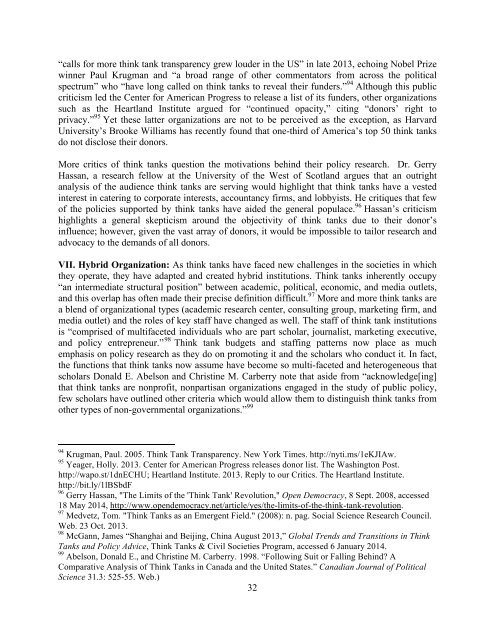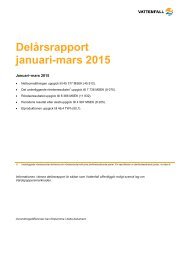2014-global-go-to-think-tank-index-22012015_1
2014-global-go-to-think-tank-index-22012015_1
2014-global-go-to-think-tank-index-22012015_1
- No tags were found...
Create successful ePaper yourself
Turn your PDF publications into a flip-book with our unique Google optimized e-Paper software.
“calls for more <strong>think</strong> <strong>tank</strong> transparency grew louder in the US” in late 2013, echoing Nobel Prize<br />
winner Paul Krugman and “a broad range of other commenta<strong>to</strong>rs from across the political<br />
spectrum” who “have long called on <strong>think</strong> <strong>tank</strong>s <strong>to</strong> reveal their funders.” 94 Although this public<br />
criticism led the Center for American Progress <strong>to</strong> release a list of its funders, other organizations<br />
such as the Heartland Institute argued for “continued opacity,” citing “donors’ right <strong>to</strong><br />
privacy.” 95 Yet these latter organizations are not <strong>to</strong> be perceived as the exception, as Harvard<br />
University’s Brooke Williams has recently found that one-third of America’s <strong>to</strong>p 50 <strong>think</strong> <strong>tank</strong>s<br />
do not disclose their donors.<br />
More critics of <strong>think</strong> <strong>tank</strong>s question the motivations behind their policy research. Dr. Gerry<br />
Hassan, a research fellow at the University of the West of Scotland argues that an outright<br />
analysis of the audience <strong>think</strong> <strong>tank</strong>s are serving would highlight that <strong>think</strong> <strong>tank</strong>s have a vested<br />
interest in catering <strong>to</strong> corporate interests, accountancy firms, and lobbyists. He critiques that few<br />
of the policies supported by <strong>think</strong> <strong>tank</strong>s have aided the general populace. 96 Hassan’s criticism<br />
highlights a general skepticism around the objectivity of <strong>think</strong> <strong>tank</strong>s due <strong>to</strong> their donor’s<br />
influence; however, given the vast array of donors, it would be impossible <strong>to</strong> tailor research and<br />
advocacy <strong>to</strong> the demands of all donors.<br />
VII. Hybrid Organization: As <strong>think</strong> <strong>tank</strong>s have faced new challenges in the societies in which<br />
they operate, they have adapted and created hybrid institutions. Think <strong>tank</strong>s inherently occupy<br />
“an intermediate structural position” between academic, political, economic, and media outlets,<br />
and this overlap has often made their precise definition difficult. 97 More and more <strong>think</strong> <strong>tank</strong>s are<br />
a blend of organizational types (academic research center, consulting group, marketing firm, and<br />
media outlet) and the roles of key staff have changed as well. The staff of <strong>think</strong> <strong>tank</strong> institutions<br />
is “comprised of multifaceted individuals who are part scholar, journalist, marketing executive,<br />
and policy entrepreneur.” 98 Think <strong>tank</strong> budgets and staffing patterns now place as much<br />
emphasis on policy research as they do on promoting it and the scholars who conduct it. In fact,<br />
the functions that <strong>think</strong> <strong>tank</strong>s now assume have become so multi-faceted and heterogeneous that<br />
scholars Donald E. Abelson and Christine M. Carberry note that aside from “acknowledge[ing]<br />
that <strong>think</strong> <strong>tank</strong>s are nonprofit, nonpartisan organizations engaged in the study of public policy,<br />
few scholars have outlined other criteria which would allow them <strong>to</strong> distinguish <strong>think</strong> <strong>tank</strong>s from<br />
other types of non-<strong>go</strong>vernmental organizations.” 99<br />
94 Krugman, Paul. 2005. Think Tank Transparency. New York Times. http://nyti.ms/1eKJIAw.<br />
95 Yeager, Holly. 2013. Center for American Progress releases donor list. The Washing<strong>to</strong>n Post.<br />
http://wapo.st/1dnECHU; Heartland Institute. 2013. Reply <strong>to</strong> our Critics. The Heartland Institute.<br />
http://bit.ly/1lBSbdF<br />
96 Gerry Hassan, "The Limits of the 'Think Tank' Revolution," Open Democracy, 8 Sept. 2008, accessed<br />
18 May <strong>2014</strong>, http://www.opendemocracy.net/article/yes/the-limits-of-the-<strong>think</strong>-<strong>tank</strong>-revolution.<br />
97 Medvetz, Tom. "Think Tanks as an Emergent Field." (2008): n. pag. Social Science Research Council.<br />
Web. 23 Oct. 2013.<br />
98 McGann, James “Shanghai and Beijing, China August 2013,” Global Trends and Transitions in Think<br />
Tanks and Policy Advice, Think Tanks & Civil Societies Program, accessed 6 January <strong>2014</strong>.<br />
99 Abelson, Donald E., and Christine M. Carberry. 1998. “Following Suit or Falling Behind A<br />
Comparative Analysis of Think Tanks in Canada and the United States.” Canadian Journal of Political<br />
Science 31.3: 525-55. Web.)<br />
32




